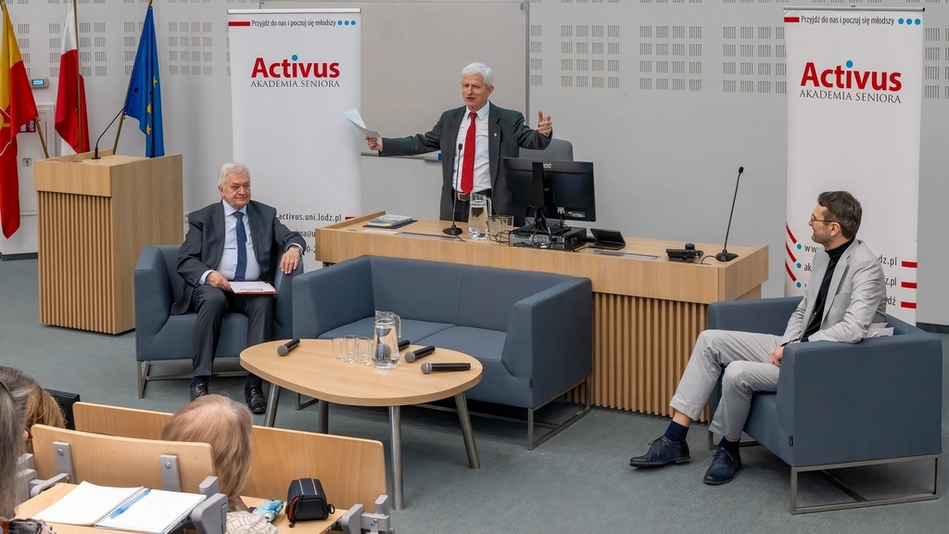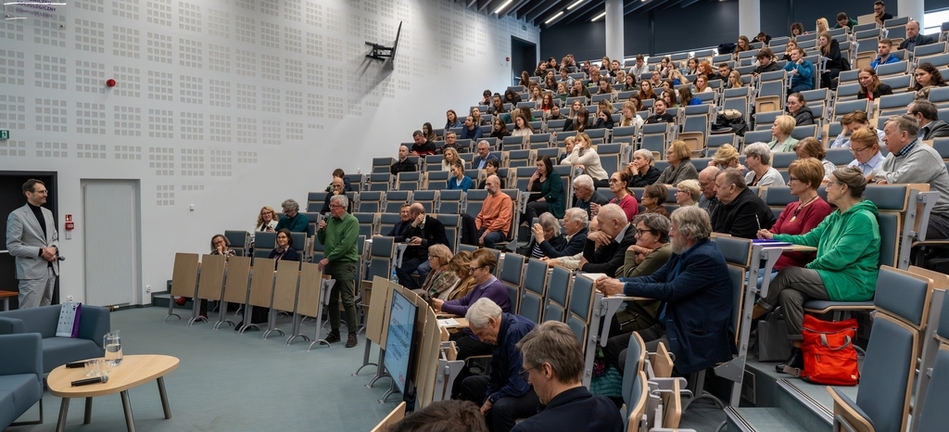
Prof. Roman Kuźniar recalled facts from Poland's recent history related to the intentions of Polish elites and authorities to have Poland join political organisations and structures of Western Europe, as well as the dominant way of thinking that favoured the desire to ally with the European Communities.
Already at the turn of the 1980s and 1990s, Minister of Foreign Affairs Krzysztof Skubiszewski defined the concepts necessary to start talks on joining the Community, and in 1989, Prime Minister Tadeusz Mazowiecki, in his various speeches, formulated a slogan for Polish international policy: "Return to Europe". These statements resulted from the belief that the Community (today the European Union) means shared values, and the European Union as a political project is the most peaceful region in the world.
On 1 February 1994, the Europe Agreement entered into force, establishing Poland's association with the European Community. It was an important moment marking the perspective of negotiations for our country's membership in the European Union. Minister Krzysztof Skubiszewski called the association agreement a historic moment.
Poland can only be European or Moscow, tertium non datur
– emphasized Minister Skubiszewski.
On 1 May 2004, formal procedures were completed and Poland's membership in the European Union began. The nationwide ceremony of raising the European Union flag in front of the building of the European Institute in Lodz, with the participation of the then Prime Minister Leszek Miller, was recalled in a short documentary film shown immediately after the lecture by Prof. Kuźniar.
The time of accession efforts and the past 20 years in the European Union is, according to Prof. Roman Kuźniar's best 30 years in the history of Poland since the times of Mieszko I. This is proven by four criteria used by scientists to determine the functioning of the state:
- peace in external relations,
- peace "at home", without internal revolutions, civil wars, etc.,
- an increase in the well-being of citizens, today most often measured by an increase in GDP per capita;
- civilisational growth/development.
According to Prof. Kuźniar, Poland was the largest beneficiary of accession to the European Union among the Eastern European countries. Referring to the title "A gdyby Wspólnoty nie było..." he said that we would remain in an unfavourable geopolitical position between Germany and Russia. But thanks to the fact that the Community existed and Poland, by joining the European Union, became its member, the dilemma of choice disappeared: we have become the West. Moreover, Germany has become our ally and the main advocate of our accession to the European Union and NATO. There was also an end to Poland's loneliness in relations with Russia.
By joining the European Union, we have gained influence on European affairs. We are present in discussions and decision-making, in Brussels and Strasbourg. Throughout twenty years – since 1 May 2004 – Poland has achieved significant material and civilisational benefits thanks to our presence in the European Union. It has received EUR 163 billion net over these years, not including the previous ten years of pre-accession assistance. Poland has gained access to the single common market of the EU, thanks to which the value of our exports (over twenty years) increased almost tenfold, including to the very demanding European market. Foreign investments have wonderfully modernised our production and service base. The increase in GDP per capita in the year of Poland's accession to the European Union was at the level of 39 percent of the European average (EU member states), currently it is 80 percent of the average of EU member states with a constant upward trend. This means that if the Community did not exist or we had not joined it, we would not have all the development opportunities mentioned above
– underlined Prof. Kuźniar.

Additionally, we derive civilisational and cultural benefits from our presence in the European Union, e.g. an increase in the life expectancy of Poles resulting from changes in the way of life, the disappearance of borders between Community countries – moving around Europe without any difficulties (e.g. former border controls or the need to obtain visas), renovation or conservation of Polish cultural objects with European funds. This means that Poland has undergone thorough Europeanisation – the lecturer concluded.
Prof. Kuźniar also mentioned current problems and threats to Poland's functioning in the European Union, e.g. concerns about Polexit. He recalled the warning given by Minister Skubiszewski in May 1992:
Membership in the Community will be a barrier against the recidivism of authoritarian-nationalist instincts.
According to Prof. Kuźniar, we should treat Europe as a wider homeland. This is how it was treated, among others by: Jan Paweł II, Zbigniew Herbert, Archbishop Józef Życiński, Jarosław Iwaszkiewicz. This is how Wojciech B. Jastrzębowski, who wrote the first Constitution for Europe in 1831, saw Europe.
We should treat Wojciech B. Jastrzębowski as the patron of our dreams about Europe – the homeland of free people who are subject to the laws only those they themselves establish. What is missing in our approach to Europe is "European patriotism", also understood as an obligation. The alternative approach formulated as Europe of homelands is the slogan of people who are reluctant to Europe, it is the approach of Europe's opponents, more or less open
– said Prof. Roman Kuźniar.
He ended his lecture with a quote from Jarosław Iwaszkiewicz's volume of poems "Return to Europe".
The meeting ended with a questions and answers session.
Prof. dr hab. Roman Kuźniar is an Associate Professor at the University of Warsaw, Head of the Department of Strategic Studies of the Institute of International Relations of the University of Warsaw. In 1977, he graduated from the Faculty of Journalism and Political Science of the University of Warsaw. Since then he has been associated with the faculty (at the Institute of International Relations). In the years 1990-2015 he was also active outside the University of Warsaw: in the Ministry of Foreign Affairs, where, among other things, he was twice the Director of the Department for Planning and Analysis, a Minister-Plenipotentiary at the Permanent Representation of the Republic of Poland at the United Nations in Geneva. He was also the Director of the Academy of Diplomacy of the Ministry of Foreign Affairs and the Director of the Polish Institute of International Affairs (2005-2007). In the years 2010-2015 he was an advisor to the President of the Republic of Poland. Additionally, he is a titular ambassador; awarded with the French Legion of Honor. His passions include mountains and skiing. He is an initiator and the editor-in-chief of Rocznik Strategiczny (RS) published since 1996. Prof. Kuźniar is an initiator of the Consortium of Academic Institutions of Strategic (and Security) Studies, which has been operating since 2015. He is the President of the Programme Councils of the Krzysztof Skubiszewski Foundation and My Obywatele Unii Europejskiej – Fundacja im. Wojciecha B. Jastrzębowskiego. Prof. Roman Kuźniar's book "Zmierzch liberalnego porządku międzynarodowego 2011-2021", published and submitted by the Scholar Publishing House, was in the finals of the 9th edition of the competition for the Award of the First Rector of the University of Lodz, Professor Tadeusz Kotarbiński 2023 for for an outstanding piece of work in the field of humanities, organised by the University of Lodz
The lecture by Prof. Roman Kuźniar was a joint initiative of the Dean of the Faculty of Economics and Sociology of the University of Lodz and the Activus Senior Academy. Before the lecture, it was emphasized that the cooperation of the dean and the Activus Foundation in the form of joint initiatives during the past two terms of office of the Dean's authorities (2016-2024) had been undertaken many times. It served, among others, connecting generations: the youngest (students), middle (scientific and teaching staff) and the older generation, i.e. participants of the Activus Senior Academy. Its effects have always met with considerable interest and building positive relationships within the faculty and the university community.
Source: Marek Chałas
Edit: Communications and PR Centre, University of Lodz
Photos: Anna Jakubowska
